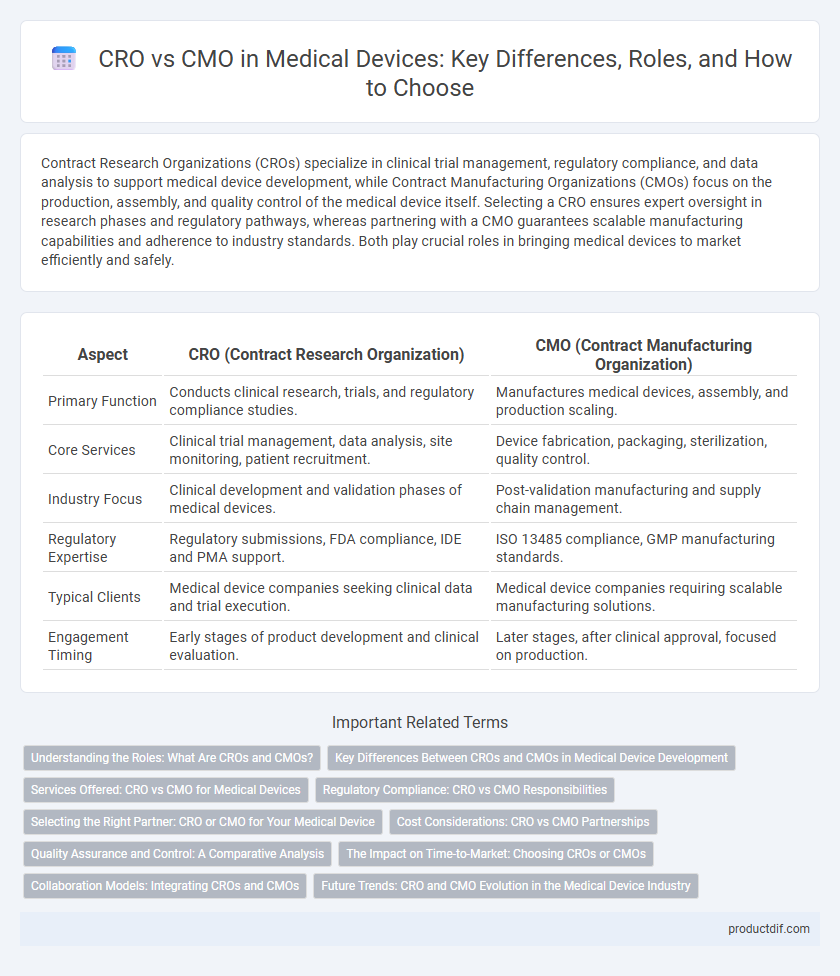Contract Research Organizations (CROs) specialize in clinical trial management, regulatory compliance, and data analysis to support medical device development, while Contract Manufacturing Organizations (CMOs) focus on the production, assembly, and quality control of the medical device itself. Selecting a CRO ensures expert oversight in research phases and regulatory pathways, whereas partnering with a CMO guarantees scalable manufacturing capabilities and adherence to industry standards. Both play crucial roles in bringing medical devices to market efficiently and safely.
Table of Comparison
| Aspect | CRO (Contract Research Organization) | CMO (Contract Manufacturing Organization) |
|---|---|---|
| Primary Function | Conducts clinical research, trials, and regulatory compliance studies. | Manufactures medical devices, assembly, and production scaling. |
| Core Services | Clinical trial management, data analysis, site monitoring, patient recruitment. | Device fabrication, packaging, sterilization, quality control. |
| Industry Focus | Clinical development and validation phases of medical devices. | Post-validation manufacturing and supply chain management. |
| Regulatory Expertise | Regulatory submissions, FDA compliance, IDE and PMA support. | ISO 13485 compliance, GMP manufacturing standards. |
| Typical Clients | Medical device companies seeking clinical data and trial execution. | Medical device companies requiring scalable manufacturing solutions. |
| Engagement Timing | Early stages of product development and clinical evaluation. | Later stages, after clinical approval, focused on production. |
Understanding the Roles: What Are CROs and CMOs?
Contract Research Organizations (CROs) specialize in managing clinical trials, regulatory submissions, and data analysis to support medical device development. Contract Manufacturing Organizations (CMOs) focus on producing medical devices, ensuring quality control, and scaling manufacturing processes according to regulatory standards. Understanding the distinct roles of CROs and CMOs is crucial for optimizing the development and production lifecycle of medical devices.
Key Differences Between CROs and CMOs in Medical Device Development
Contract Research Organizations (CROs) in medical device development specialize in clinical trial management, regulatory affairs, and testing services to ensure device safety and efficacy. Contract Manufacturing Organizations (CMOs) focus on the production, assembly, and packaging of medical devices, providing scalable manufacturing solutions compliant with industry standards such as ISO 13485. Key differences include CROs' expertise in research and regulatory pathways versus CMOs' role in manufacturing logistics and quality control processes.
Services Offered: CRO vs CMO for Medical Devices
Contract Research Organizations (CROs) specialize in clinical trial management, regulatory affairs support, and product development consulting for medical devices, enabling efficient data collection and compliance with regulatory standards. Contract Manufacturing Organizations (CMOs) focus on the production, assembly, and quality control of medical devices, ensuring scalable manufacturing processes and adherence to industry certifications like ISO 13485. Choosing between a CRO and CMO depends on whether the primary need is research and development services or manufacturing expertise within the medical device lifecycle.
Regulatory Compliance: CRO vs CMO Responsibilities
Contract Research Organizations (CROs) primarily manage Clinical Trial Applications (CTA) and ensure adherence to Good Clinical Practice (GCP) and Institutional Review Board (IRB) approvals, focusing on regulatory compliance throughout the clinical trial process. Contract Manufacturing Organizations (CMOs) are responsible for complying with Good Manufacturing Practice (GMP) regulations, validating manufacturing processes, and maintaining documentation for regulatory inspections and submissions. Both entities collaborate to ensure seamless regulatory compliance, but CROs concentrate on clinical study compliance while CMOs focus on manufacturing quality assurance.
Selecting the Right Partner: CRO or CMO for Your Medical Device
Choosing between a Contract Research Organization (CRO) and a Contract Manufacturing Organization (CMO) for your medical device depends on your project's phase and specific needs. CROs specialize in clinical trials and regulatory compliance to ensure safety and efficacy, while CMOs focus on manufacturing, scaling production, and quality assurance. Aligning your partnership choice with development goals accelerates market entry and optimizes resource allocation.
Cost Considerations: CRO vs CMO Partnerships
Cost considerations play a crucial role in choosing between a Contract Research Organization (CRO) and a Contract Manufacturing Organization (CMO) for medical device companies. CRO partnerships typically involve variable costs tied to specific research activities such as clinical trials, regulatory submissions, and product development, offering flexibility but potential unpredictability in budget allocation. In contrast, CMO collaborations often entail fixed manufacturing expenses and economies of scale, which can lead to reduced per-unit costs but require upfront investment and long-term commitments.
Quality Assurance and Control: A Comparative Analysis
In the medical device industry, Contract Research Organizations (CROs) primarily focus on Quality Assurance (QA) by overseeing regulatory compliance and clinical trial integrity, ensuring products meet stringent safety standards. Contract Manufacturing Organizations (CMOs) emphasize Quality Control (QC) through meticulous production monitoring, batch testing, and defect detection to maintain product consistency and reliability. This complementary division enhances overall product quality, with CROs validating processes and CMOs executing precise manufacturing controls.
The Impact on Time-to-Market: Choosing CROs or CMOs
Contract Research Organizations (CROs) accelerate time-to-market by managing clinical trials, regulatory submissions, and data analysis, ensuring medical devices meet compliance efficiently. Contract Manufacturing Organizations (CMOs) streamline production scale-up, component sourcing, and quality assurance, reducing manufacturing lead times crucial for timely market entry. Selecting CROs or CMOs strategically impacts overall development timelines, with CROs driving faster regulatory approval and CMOs enabling rapid manufacturing deployment.
Collaboration Models: Integrating CROs and CMOs
Collaboration models integrating Contract Research Organizations (CROs) and Contract Manufacturing Organizations (CMOs) streamline medical device development by combining expertise in clinical research and manufacturing processes. This integration accelerates timelines, enhances quality control, and ensures regulatory compliance through synchronized workflows and data sharing platforms. Effective partnerships leverage CROs' trial management capabilities and CMOs' production scalability, optimizing overall product lifecycle management.
Future Trends: CRO and CMO Evolution in the Medical Device Industry
Contract Research Organizations (CROs) and Contract Manufacturing Organizations (CMOs) are evolving with advancements in medical device innovation, integrating AI-driven data analytics and personalized device development to enhance efficiency and regulatory compliance. The convergence of CRO and CMO capabilities fosters streamlined clinical trials and scalable manufacturing processes, accelerating time-to-market for groundbreaking medical technologies. Future trends emphasize collaborative ecosystems and digital transformation, enabling adaptive workflows and real-time quality control across the medical device value chain.
CRO vs CMO Infographic

 productdif.com
productdif.com